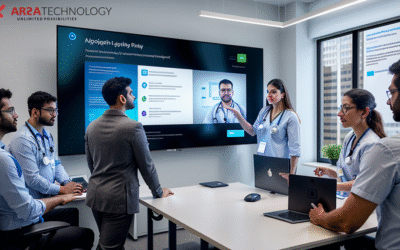Introduction: Overcoming Manual Quality Monitoring Processes in the Call Center Industry
In the fast-paced world of call centers, efficiency, accuracy, and customer satisfaction are paramount. Yet, many organizations still grapple with the cumbersome and resource-intensive challenge of manual quality monitoring. This traditional approach, often involving human agents listening to a small sample of calls, is inherently inefficient, prone to human bias, and simply cannot scale to meet the demands of modern call volumes. The result? Missed opportunities for agent coaching, delayed identification of critical customer issues, and an incomplete understanding of overall operational performance.
For software developers, solutions architects, CTOs, and product managers tasked with enhancing call center productivity and gleaning actionable insights from vast amounts of voice data, the limitations of manual processes are clear. The need for a robust, automated solution that can accurately transcribe every customer interaction, turning raw voice data into structured, searchable text, has never been more critical. This is where advanced Speech-to-Text (STT) API technology becomes a game-changer.
ARSA Technology offers a high-performance Speech-to-Text API designed to revolutionize how call centers operate, specifically by automating voice note transcription for productivity apps and eliminating the bottlenecks of manual quality monitoring. This guide serves as a comprehensive overview for organizations looking to migrate from existing, less effective solutions to our highly accurate transcription API, paving the way for unprecedented operational efficiency and deeper customer understanding.
The Hidden Costs of Manual Monitoring in Call Centers
The seemingly straightforward task of manually reviewing call recordings for quality assurance, compliance, and training purposes carries significant hidden costs. Beyond the direct labor expenses, these include:
- Limited Coverage and Inaccurate Insights: Human reviewers can only audit a fraction of total calls, leading to a skewed and incomplete picture of agent performance and customer sentiment. Critical issues, compliance breaches, or emerging trends can easily be missed.
- Inconsistent Evaluation: Subjectivity is inherent in manual reviews. Different reviewers may apply varying standards, leading to inconsistent feedback for agents and unreliable performance metrics.
- Slow Feedback Loops: The time it takes to review calls, identify issues, and provide feedback to agents can be extensive, delaying crucial coaching opportunities and hindering rapid improvement.
- Scalability Challenges: As call volumes grow, the resources required for manual monitoring escalate proportionally, making it an unsustainable model for expanding operations.
- Data Silos and Missed Opportunities: Voice data remains largely untapped, preventing organizations from leveraging it for advanced analytics, trend identification, and strategic decision-making. This directly impacts the potential for productivity apps that rely on comprehensive interaction data.
These challenges collectively underscore the urgent need for a technological shift. Migrating to an advanced Speech-to-Text API is not just an upgrade; it’s a strategic imperative for any call center aiming for competitive advantage and sustained growth.
Transforming Call Center Operations with AI Transcription
ARSA Technology’s Speech-to-Text API provides a powerful antidote to the inefficiencies of manual monitoring. By converting spoken words into highly accurate text, it unlocks a wealth of data that was previously inaccessible or too costly to analyze. This transformation impacts several key areas:
- Automated Quality Assurance: Every single call can be transcribed and analyzed, allowing for a 100% audit rate. AI-driven analytics can then automatically flag keywords, phrases, sentiment shifts, and compliance adherence, providing objective, comprehensive insights.
- Enhanced Agent Training and Coaching: With full transcripts and sentiment analysis, supervisors can pinpoint specific moments in conversations for targeted coaching, leading to faster skill development and improved agent performance.
- Real-time Insights and Alerts: Transcribed data can be processed in near real-time, enabling immediate alerts for critical issues, customer churn risks, or urgent compliance matters.
- Data-Driven Decision Making: The rich textual data from all interactions becomes a valuable asset for business intelligence, allowing product teams, marketing, and operations to understand customer needs, identify product gaps, and optimize processes.
- Fueling Productivity Applications: For internal productivity tools, the API can automatically transcribe voice notes, meeting summaries, or customer interaction logs, saving agents and managers significant time and ensuring no detail is lost.
This shift from manual, reactive monitoring to automated, proactive analysis fundamentally redefines the role of quality assurance and opens new avenues for operational excellence.
Why ARSA Technology’s Speech-to-Text API Stands Out
When considering a migration, the choice of API provider is critical. ARSA Technology’s Speech-to-Text API is engineered for the rigorous demands of global enterprises and developers, offering distinct advantages for call center applications:
- Exceptional Accuracy: Our API leverages state-of-the-art AI models to deliver industry-leading transcription accuracy, even in challenging audio environments common in call centers (e.g., background noise, varied accents). This ensures that the generated text is reliable for analysis and decision-making.
- Multilingual Support: Serving a global customer base requires robust multilingual capabilities. ARSA’s API supports a wide array of languages, enabling call centers to transcribe interactions with diverse customers accurately, breaking down communication barriers and expanding market reach.
- Scalability and Performance: Built for high-performance, our API can handle massive volumes of audio data, ensuring that transcription scales seamlessly with your call center’s growth without compromising speed or reliability.
- Ease of Integration: Designed with developers in mind, our API offers straightforward integration into existing systems and applications. While we focus on conceptual benefits here, for those ready to explore, you can demo the Speech-to-Text API to see its capabilities in an interactive environment.
- Robust Security and Compliance: We understand the critical importance of data security and compliance in regulated industries like call centers. Our infrastructure is designed to protect sensitive customer information.
A Seamless Migration: From Legacy to Leading-Edge
Migrating from an existing system to a new API can seem daunting, but ARSA Technology is committed to making this transition as smooth and beneficial as possible. The process typically involves:
1. Assessment and Planning: Understanding your current infrastructure, identifying specific transcription needs, and defining success metrics for the migration. This includes evaluating existing audio formats and integration points.
2. Integration Strategy: Designing how ARSA’s Speech-to-Text API will integrate with your call recording systems, CRM, and productivity applications. Our API’s clear documentation and developer-friendly design facilitate this step.
3. Testing and Validation: Thoroughly testing the API with your specific audio data to ensure accuracy, performance, and seamless operation within your environment.
4. Phased Rollout: Implementing the new API incrementally, perhaps starting with a pilot group or specific use case, to minimize disruption and gather feedback.
5. Optimization and Expansion: Continuously monitoring performance, refining integration, and exploring new ways to leverage the transcribed data across your organization, including integrating with other AI solutions like our text-to-speech capabilities.
Our approach focuses on minimizing technical friction and maximizing business value, ensuring that your investment in ARSA’s Speech-to-Text API delivers rapid and tangible returns.
Key Benefits for Call Centers and Productivity Apps
The adoption of ARSA Technology’s Speech-to-Text API translates into a multitude of direct and indirect benefits for call centers and the productivity applications that support them:
- Enhanced Agent Performance Coaching: Supervisors gain access to complete, unbiased transcripts of every interaction. This enables precise identification of coaching opportunities, allows for objective performance reviews, and accelerates agent skill development. Instead of guessing, managers have concrete data points to guide their feedback.
- Improved Customer Experience Insights: By analyzing all customer conversations, businesses can uncover emerging trends, identify common pain points, and understand overall customer sentiment at scale. This granular insight empowers product teams to refine offerings and customer service strategies, leading to higher satisfaction and loyalty.
- Streamlined Compliance and Risk Management: In regulated industries, ensuring compliance is non-negotiable. Automated transcription allows for easy auditing of all calls against compliance checklists, flagging potential violations immediately. This significantly reduces risk and simplifies regulatory reporting.
- Unlocking Data for Business Intelligence: Voice data, once locked away in audio files, becomes a rich source of structured text. This data can be fed into business intelligence platforms to generate powerful analytics on customer behavior, market trends, agent effectiveness, and operational bottlenecks, driving strategic decisions.
- Boosting Productivity for Voice Note Applications: Beyond call transcription, the API is invaluable for internal productivity. Agents or managers can dictate voice notes, meeting summaries, or follow-up actions, and have them instantly converted into searchable text within their CRM or project management tools. This eliminates manual typing, saves time, and ensures accurate record-keeping, significantly enhancing daily workflows.
Beyond Transcription: A Holistic AI Strategy
While our Speech-to-Text API is a cornerstone for transforming call center operations, ARSA Technology offers a broader suite of AI APIs that can further enhance your communication strategy. For instance, after analyzing customer sentiment through transcribed calls, you might want to generate natural voice responses with our TTS API for automated customer service interactions or personalized outbound communications. This holistic approach allows enterprises to build comprehensive, intelligent communication platforms that deliver superior customer experiences and operational efficiency.
Conclusion: Your Next Step Towards a Solution
The era of manual quality monitoring in call centers is rapidly drawing to a close. The inefficiencies, costs, and limited insights associated with traditional methods are no longer sustainable in a competitive global market. Migrating to ARSA Technology’s Speech-to-Text API offers a clear path to automating voice note transcription, achieving 100% call coverage, and transforming raw voice data into actionable intelligence. This strategic move empowers call centers to enhance agent performance, deepen customer understanding, ensure compliance, and unlock unprecedented levels of productivity across their operations.
Embrace the future of call center management. It’s time to move beyond the limitations of the past and leverage the power of AI to drive efficiency and innovation.
Ready to Solve Your Challenges with AI?
Discover how ARSA Technology can help you overcome your toughest business challenges. Get in touch with our team for a personalized demo and a free API trial.







